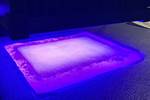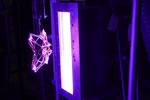EUVAM project investigates energy-efficient UV process for composites curing
University of Stuttgart researchers intend to develop flexible, highly productive and digitally controllable manufacturing approach for small urban vehicle production.

The EUVAM project is focusing on lightweight components for the structure of small urban vehicles. Photo Credit: Depositphotos
EUVAM, a new research project at the University of Stuttgart’s (Germany) will investigate curing fiber-reinforced polymers (FRP) using ultraviolet radiation (UV) to further optimize cycle times and energy consumption associated with the production of lightweight structural composite components.
The focus of the EUVAM project is to develop an energy- and time-efficient manufacturing process in order to meet the high demands of the mobility industry in terms of lightweight construction, economy and sustainability. The aim is, among other things, to implement the integration of non-transparent carbon fibers in UV-cured FRP through optimized process control in order to enable structural assemblies in the context of urban micro vehicles.
Compared to traditional FRP curing processes, the university researchers believe significant costs can be saved with the help of energy-efficient UV process control. UV curing would make isothermal process control for polymer curing in resin transfer molding (RTM) or in the wet pressing process obsolete, thus reducing time to completion, all without sacrificing final mechanical properties.
Specifically, through the use of photo-initiated polymers in the context of high-performance, fiber-reinforced lightweight construction methods, a flexible, highly productive and digitally controllable manufacturing approach can be implemented.
A demonstration of the developed technologies and concepts concludes with the implementation of a demonstrator, which is to be integrated into the ICM demonstrator vehicle (BUP14).
This project is funded by the Ministry of Science, Research and Art.
Related Content
-
Uavos tailors composite curing oven for aerospace customer
Oven-700-4000, offering precise temperature control and low operating costs, has been customized to the client’s requirements, emphasizing Uavos’ ability to deliver on the specific needs of its customers.
-
UV curing systems save composites curing time, energy
CAMX 2024: IST America presents a comprehensive selection of UV, IR and hot air technologies, designed to deliver results in less than a minute.
-
ITA, Micor GmbH study the potential of in-line infrared drying of glass fiber
Research has shown that, beyond reducing energy consumption and production waste, an integrated, compact infrared module enables uniform sizing distribution on the glass fibers and more efficient production overall.






